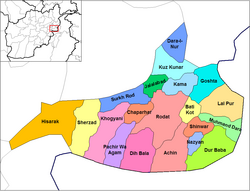Bati Kot District
This article may require cleanup to meet Wikipedia's quality standards. The specific problem is: prose, formatting. (April 2020) |
Bati Kot District | |
|---|---|
District | |
 Bati Kot District, Nangarhar Province. | |
| Country | |
| Province | Nangarhar Province |
| Capital | Hafeez Kodai |
| Population (2017[1]) | |
• Total | 300,000 (Three lack) |
| Time zone | UTC+4:30 (Afghanistan Standard Time) |
Bati Kot is a district in the east of Nangarhar Province, Afghanistan. Its population, which is 100% Pashtun, was estimated at 300,000 in 2017, of whom 25,500 were children under 12. The district is within the heartland of the Mohmand tribe of Pashtuns.[2] The district centre is Nader Shah Kot.[3]
Batikot has the following villages: Sepay, Lowartay, Sarobi, Ghaze Abad, Chardi, Khanano Kali(gary), Takya, Grabawa, Barekab, Meshwane, Lachapor, Gundyane, Kody, and Ambarkhana. Since the 2nd presidential term of Hamid Karzia, about 70% area of Bati Kot is covered by Taliban. The main centre of Taliban is in Salour Kali (چهاردهي).
The popular areas in the district are; د دریم فارم مالټې، اصحاب بابا زیارت ، سید اخند موسی زیارت ، تکیه غونډۍ ، پیرکامل ...زیارت
Notable residents
[edit]This article's list of residents may not follow Wikipedia's verifiability policy. (April 2020) |
Afghanistan cricketer Hameed Hasan was born in this district Sepay. Salor Kalai (څلور کلی) Or Chardahi is one of the villages of Bati Kot district, where a very famous person lives whose name is Amadzai Ustad, Amadzai Ustad is repairing broken bones of the human body, many people come from near and from some very far places to him to repair bones from all around Afghanistan.
The popular people of the district are: , Haji Mohammad Tahir Darwish , Haji Aziz Ur Rahman (Former member of parliament) Dr Sardar Mohammad Asif , Moinullah Moin , Dr Ajmal Mommand , Mohammad Darwish (Former District Governor) Malik Habibullah, Dr. Sediq Momand, Haji Khyal Mohammad, Dil Aram, Haji Muhibullah, Haji Farooq, Malik Zahir, Malik Shah Mahmood, Malik Nawaz Khan, Malik Thsildar Tekadar, Malik Naseem, Qumandan Sharif.
References
[edit]- ^ MRRD Provincial profile for Nangarhar Province
- ^ Nangarhar Province Tribal Map (Page 9). Naval Postgraduate School.
- ^ UNHCR District Profile, dated 2002-12-05, accessed 2006-07-06 (PDF)]
External links
[edit]- Map of Bati Kot (PDF)

